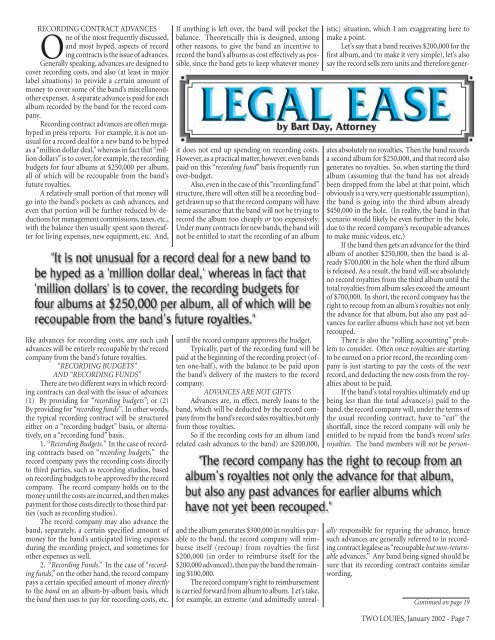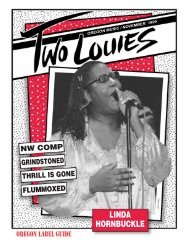OREGON STUDIO/MASTERING - Two Louies Magazine
OREGON STUDIO/MASTERING - Two Louies Magazine
OREGON STUDIO/MASTERING - Two Louies Magazine
You also want an ePaper? Increase the reach of your titles
YUMPU automatically turns print PDFs into web optimized ePapers that Google loves.
RECORDING CONTRACT ADVANCES<br />
One of the most frequently discussed,<br />
and most hyped, aspects of record<br />
ing contracts is the issue of advances.<br />
Generally speaking, advances are designed to<br />
cover recording costs, and also (at least in major<br />
label situations) to provide a certain amount of<br />
money to cover some of the band’s miscellaneous<br />
other expenses. A separate advance is paid for each<br />
album recorded by the band for the record company.<br />
Recording contract advances are often megahyped<br />
in press reports. For example, it is not unusual<br />
for a record deal for a new band to be hyped<br />
as a “million dollar deal,” whereas in fact that “million<br />
dollars” is to cover, for example, the recording<br />
budgets for four albums at $250,000 per album,<br />
all of which will be recoupable from the band’s<br />
future royalties.<br />
A relatively small portion of that money will<br />
go into the band’s pockets as cash advances, and<br />
even that portion will be further reduced by deductions<br />
for management commissions, taxes, etc.,<br />
with the balance then usually spent soon thereafter<br />
for living expenses, new equipment, etc. And,<br />
like advances for recording costs, any such cash<br />
advances will be entirely recoupable by the record<br />
company from the band’s future royalties.<br />
“RECORDING BUDGETS”<br />
AND “RECORDING FUNDS”<br />
There are two different ways in which recording<br />
contracts can deal with the issue of advances:<br />
(1) By providing for “recording budgets”; or (2)<br />
By providing for “recording funds”. In other words,<br />
the typical recording contract will be structured<br />
either on a “recording budget” basis, or alternatively,<br />
on a “recording fund” basis.<br />
1. “Recording Budgets.” In the case of recording<br />
contracts based on “recording budgets,” the<br />
record company pays the recording costs directly<br />
to third parties, such as recording studios, based<br />
on recording budgets to be approved by the record<br />
company. The record company holds on to the<br />
money until the costs are incurred, and then makes<br />
payment for those costs directly to those third parties<br />
(such as recording studios).<br />
The record company may also advance the<br />
band, separately, a certain specified amount of<br />
money for the band’s anticipated living expenses<br />
during the recording project, and sometimes for<br />
other expenses as well.<br />
2. “Recording Funds.” In the case of “recording<br />
funds,” on the other hand, the record company<br />
pays a certain specified amount of money directly<br />
to the band on an album-by-album basis, which<br />
the band then uses to pay for recording costs, etc.<br />
If anything is left over, the band will pocket the<br />
balance. Theoretically this is designed, among<br />
other reasons, to give the band an incentive to<br />
record the band’s albums as cost effectively as possible,<br />
since the band gets to keep whatever money<br />
it does not end up spending on recording costs.<br />
However, as a practical matter, however, even bands<br />
paid on this “recording fund” basis frequently run<br />
over-budget.<br />
Also, even in the case of this “recording fund”<br />
structure, there will often still be a recording budget<br />
drawn up so that the record company will have<br />
some assurance that the band will not be trying to<br />
record the album too cheaply or too expensively.<br />
Under many contracts for new bands, the band will<br />
not be entitled to start the recording of an album<br />
until the record company approves the budget.<br />
Typically, part of the recording fund will be<br />
paid at the beginning of the recording project (often<br />
one-half), with the balance to be paid upon<br />
the band’s delivery of the masters to the record<br />
company.<br />
ADVANCES ARE NOT GIFTS<br />
Advances are, in effect, merely loans to the<br />
band, which will be deducted by the record company<br />
from the band’s record sales royalties, but only<br />
from those royalties.<br />
So if the recording costs for an album (and<br />
related cash advances to the band) are $200,000,<br />
and the album generates $300,000 in royalties payable<br />
to the band, the record company will reimburse<br />
itself (recoup) from royalties the first<br />
$200,000 (in order to reimburse itself for the<br />
$200,000 advanced), then pay the band the remaining<br />
$100,000.<br />
The record company’s right to reimbursement<br />
is carried forward from album to album. Let’s take,<br />
for example, an extreme (and admittedly unreal-<br />
istic) situation, which I am exaggerating here to<br />
make a point.<br />
Let’s say that a band receives $200,000 for the<br />
first album, and (to make it very simple), let’s also<br />
say the record sells zero units and therefore gener-<br />
ates absolutely no royalties. Then the band records<br />
a second album for $250,000, and that record also<br />
generates no royalties. So, when starting the third<br />
album (assuming that the band has not already<br />
been dropped from the label at that point, which<br />
obviously is a very, very questionable assumption),<br />
the band is going into the third album already<br />
$450,000 in the hole. (In reality, the band in that<br />
scenario would likely be even further in the hole,<br />
due to the record company’s recoupable advances<br />
to make music videos, etc.)<br />
If the band then gets an advance for the third<br />
album of another $250,000, then the band is already<br />
$700,000 in the hole when the third album<br />
is released. As a result, the band will see absolutely<br />
no record royalties from the third album until the<br />
total royalties from album sales exceed the amount<br />
of $700,000. In short, the record company has the<br />
right to recoup from an album’s royalties not only<br />
the advance for that album, but also any past advances<br />
for earlier albums which have not yet been<br />
recouped.<br />
There is also the “rolling accounting” problem<br />
to consider. Often once royalties are starting<br />
to be earned on a prior record, the recording company<br />
is just starting to pay the costs of the next<br />
record, and deducting the new costs from the royalties<br />
about to be paid.<br />
If the band’s total royalties ultimately end up<br />
being less than the total advance(s) paid to the<br />
band, the record company will, under the terms of<br />
the usual recording contract, have to “eat” the<br />
shortfall, since the record company will only be<br />
entitled to be repaid from the band’s record sales<br />
royalties. The band members will not be person-<br />
ally responsible for repaying the advance, hence<br />
such advances are generally referred to in recording<br />
contract legalese as “recoupable but non-returnable<br />
advances.” Any band being signed should be<br />
sure that its recording contract contains similar<br />
wording.<br />
Continued on page 19<br />
TWO LOUIES, January 2002 - Page 7











